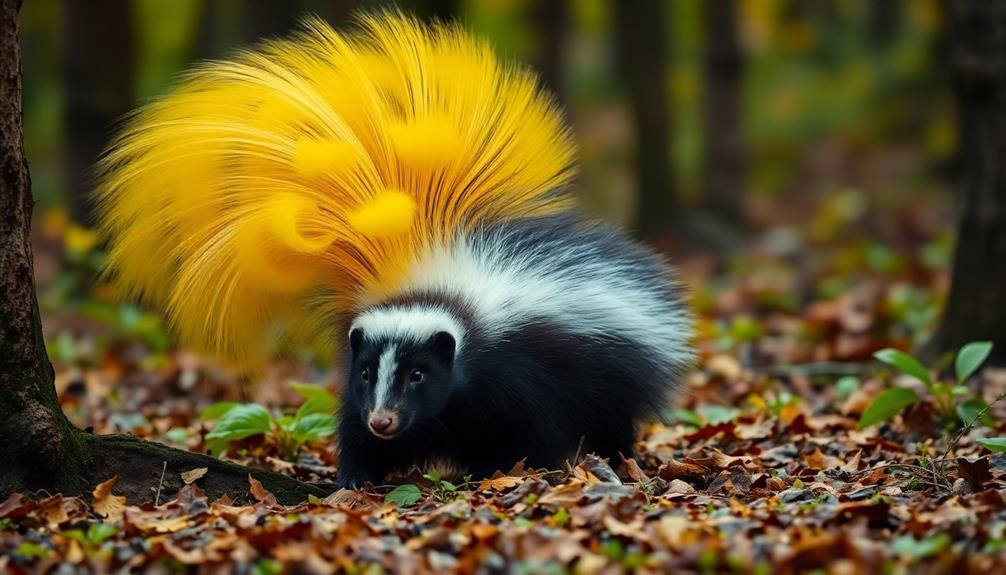Skunk spray packs a punch! You'll catch a whiff that many say resembles rotten eggs mixed with burnt rubber or gasoline. It's such a strong smell that you might even detect it from half a mile away! Fresh skunk spray can stick around for weeks and cling to surfaces, making it hard to forget. While some people find it unbearable, others might feel a bit nostalgic. Just remember, if you're ever too close, it can cause eye irritation and respiratory issues, so it's wise to keep your distance. Want to understand more about skunks and their fascinating behavior?
Key Takeaways
- Skunk spray has a strong, pungent odor often likened to rotten eggs, burnt rubber, or gasoline.
- The smell can be detected from significant distances, up to half a mile away.
- Fresh skunk spray has an overwhelming scent that can linger for weeks due to its oily nature.
- Individual reactions to the odor vary, with some finding it unbearable while others may feel nostalgic.
- The primary chemical responsible for the smell is thiol, a sulfur-containing organic compound.
Introduction
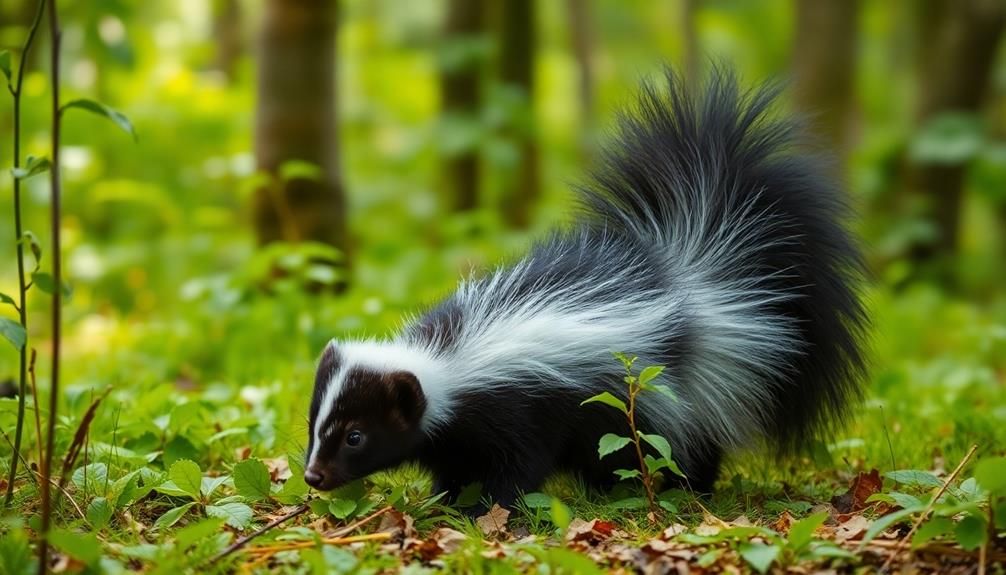
When you catch a whiff of skunk spray, you're in for a pungent experience that's hard to forget. The skunk smell hits you like a wall, making your nose wrinkle up instantly. You might be surprised to learn that this strong odor comes from a chemical called thiol, which gives skunk spray its signature unpleasant scent, often compared to rotten eggs.
This unpleasant smell can be particularly troublesome for those with respiratory sensitivities, making air quality management essential, especially in areas where skunks are prevalent health benefits of air purifiers.
Fresh skunk spray is much more intense than the faint scent you might notice from a distance, which can remind you of burnt rubber or gasoline. If you're close enough, the skunk spray odor can linger for weeks, clinging to everything in its path.
It's not just in the air; it can stick to objects and even your clothes, making it tough to get rid of.
Interestingly, skunk spray can be detected from half a mile away, so if you're in the area, you'll likely know it when it hits. Individual reactions vary, too; some people find the smell less offensive than others, like rotting fish.
Description of the Smell
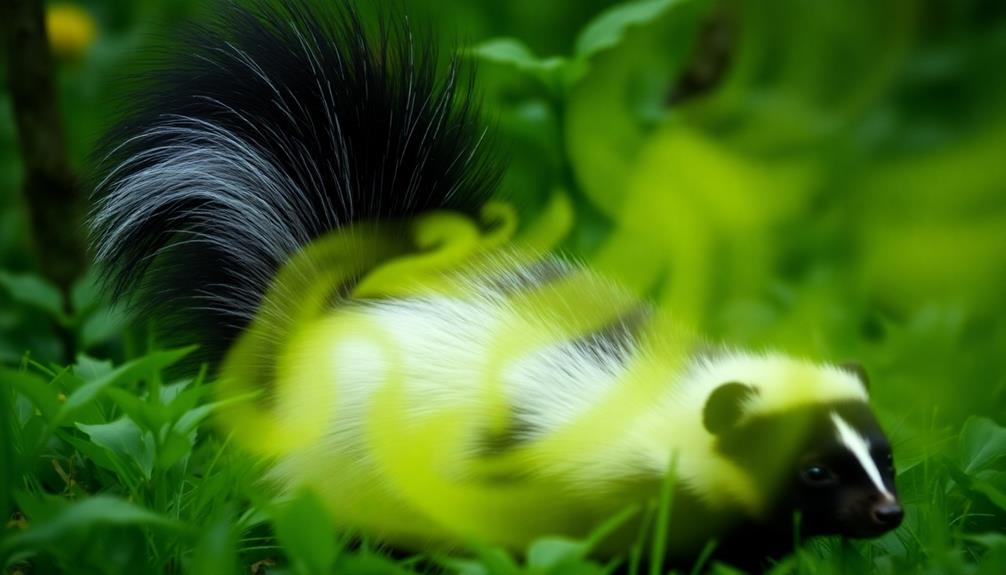
Skunk spray's smell is unmistakably potent, hitting you with a blend of pungent thiols that create an overwhelming sensory experience. When you catch a whiff of skunk spray, you might find yourself wrinkling your nose at an odor that's often described as a mix of rotten eggs and sulfur.
It's a unique smell, almost like burnt rubber or gasoline, with hints of something gas-like and foul. Interestingly, this smell can evoke a range of reactions, much like how silly tantrums often occur during family photoshoots, adding humor to the moment.
The intensity of this organic compound can change depending on how close you're to the source. If you're nearby, the fresh skunk spray will hit you harder, leaving a concentrated scent that can overwhelm your senses.
Surprisingly, this smell can linger for weeks! That's because it's oily and sticks to surfaces, affecting everything around it.
Interestingly, not everyone reacts the same way. While some might find the scent unbearable, others may even find it neutral or reminiscent of late spring and summer nights.
Source and Composition
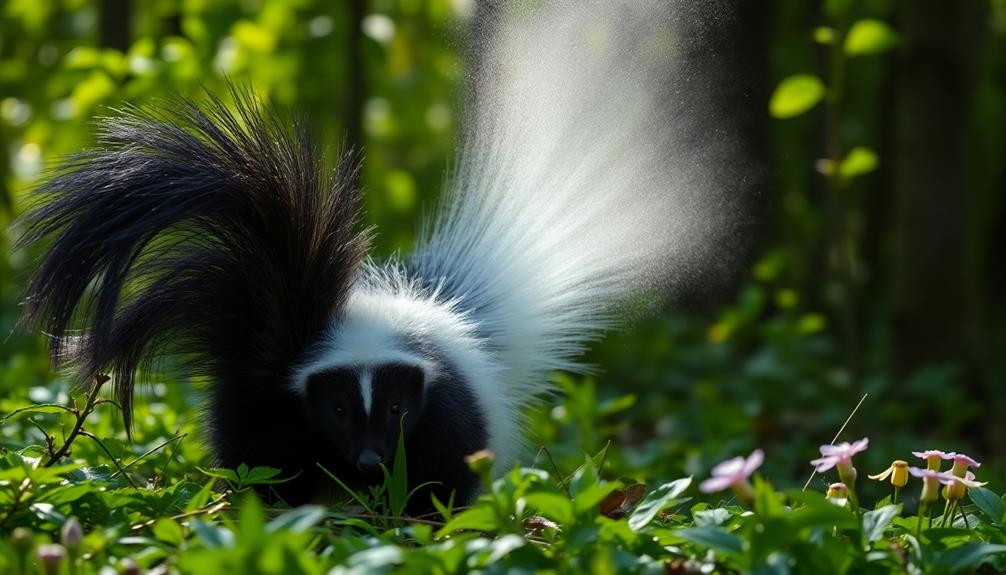
Although often associated with the animal itself, skunk spray actually comes from specialized glands located near the base of the tail. These glands produce a strong-smelling liquid, primarily made up of thiols, which are organic compounds containing sulfur. This is what gives skunk spray its infamous odor.
Interestingly, similar to how Apple emphasizes user data protection through innovative technology, skunks have evolved this potent defense mechanism to ward off predators.
When you catch a whiff of skunk spray, you might think of rotten eggs, burnt rubber, or even natural gas. Fresh skunk spray has an especially intense smell that can be quite overwhelming!
It's fascinating to note that this odor can linger for weeks and can be detected from up to half a mile away. So, if you ever find yourself in the vicinity of a skunk, you'll definitely know it!
Direct exposure to skunk spray can be more than just unpleasant—it can cause stinging eyes and temporary blindness due to its chemical makeup. That's why it's best to keep your distance.
Understanding where skunk spray comes from and what it contains helps you appreciate the smell, even if you'd prefer not to experience it firsthand!
Typical Scenarios or Environments
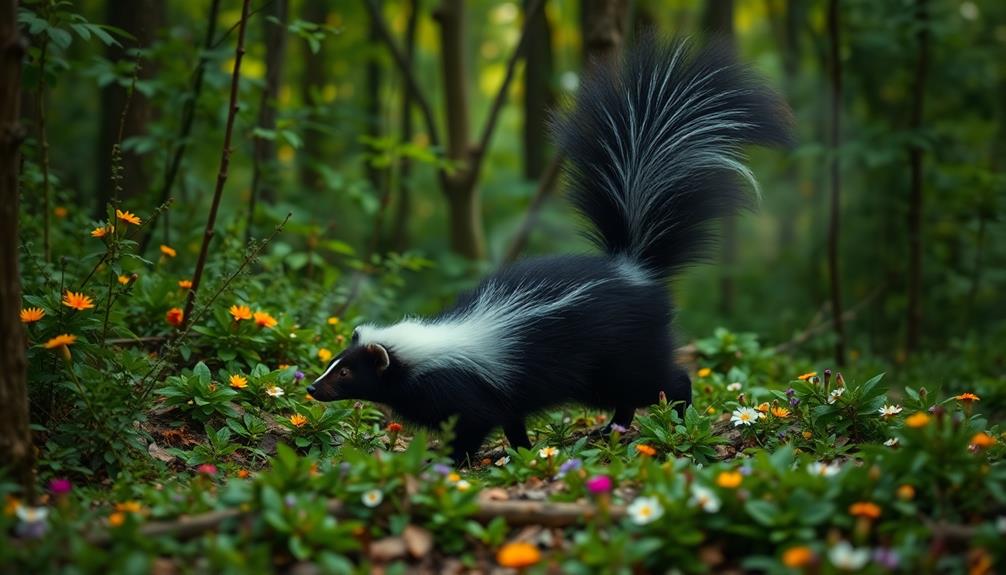
During late spring and summer, you're more likely to encounter skunk spray, as these creatures become particularly active. Skunks roam more during this time, especially during their mating season.
Imagine walking outside on a warm evening and suddenly catching a whiff of that unmistakable skunk spray. The smell can hit you like a wall, often described as a mix of rotten eggs, burnt rubber, or even sulfur. It's so strong that you might think you can smell it from half a mile away!
If you've ever had the unfortunate experience of smelling fresh skunk spray, you know how intense it can be. In contrast, older or distant odors mightn't be as powerful, but they're still unpleasant. During mating season, the scent can become even more concentrated, reminding some of rotting garlic or cabbage.
Skunk spray isn't just an outdoor problem; it can cling to household items and linger in outdoor areas, making it tough to get rid of.
Emotional or Cultural Associations

When you catch a whiff of skunk spray, it often stirs up a mix of emotions and cultural references. For many, that distinct odor brings a wave of nostalgia, reminding you of childhood adventures in the great outdoors. Perhaps you remember a camping trip where a curious skunk waddled by, leaving its unmistakable mark. Those memories can turn an unpleasant smell into a funny story shared with friends.
Culturally, skunk spray has become a metaphor for strong, offensive odors, often popping up in cartoons or comedy shows. It's fascinating how something so pungent can inspire laughter and creativity! Some people even find the smell "natural," while others find it overwhelmingly repulsive. This difference shows how our reactions to skunk spray are influenced by personal experiences and cultural backgrounds.
In schools and nature programs, educators use the strong scent to teach about animal behavior, capturing the attention of students.
Whether you love it or hate it, skunk spray's unique smell connects us to nature, sparking both memories and conversations. So, the next time you catch that scent, think about what it means to you; it might just bring a smile!
Health or Safety Considerations

Encountering skunk spray can be more than just an unpleasant experience; it poses several health and safety concerns. When skunks spray, they release thiols, which are organic compounds with sulfur. This creates a smell often compared to rotten eggs or burnt rubber.
If you or your pets come into contact with skunk spray, it can lead to respiratory distress. So, it's best to stay clear after an encounter!
The spray can also cause stinging and irritation in your eyes, and if it hits your eyes directly, it might even lead to temporary blindness. Ouch! While skunk spray isn't toxic and isn't likely to be lethal, it's important to be cautious. If ingested or if it gets in your eyes, seek immediate help.
Also, remember that skunks can carry rabies, making it crucial for pets to be vaccinated. That way, you can prevent any potential transmission after an encounter.
Always keep these health or safety considerations in mind when dealing with skunks. Staying informed helps you enjoy nature while keeping yourself and your furry friends safe!
Final Thoughts

In summary, skunk spray is a unique and powerful odor that can create quite a stir if you or your pets come into contact with it. If your dog has been sprayed, you might feel overwhelmed by the strong scent, which can remind you of rotten eggs or burnt rubber.
The smell can stick around for weeks, affecting not just your furry friend but your home too!
When dealing with skunk spray, timely skunk spray removal is crucial. You can use a homemade solution of hydrogen peroxide, baking soda, and dish soap to help neutralize the odor effectively.
Remember, the smell can change over time, so don't be surprised if it seems less intense after a few days.
It's essential to take precautions during direct exposure, as the spray can cause eye irritation or breathing issues. If you act quickly, you can make the experience less traumatic for both you and your pet.
Frequently Asked Questions
Does Skunk Spray Smell Like Burnt Rubber?
You'll find that skunk spray does have a resemblance to burnt rubber for many. Its intense odor can overwhelm your senses, lingering long after, much like the smell of burnt materials or even rotten eggs.
How Do You Know When a Skunk Sprays?
You'll know a skunk sprays when you see it arch its tail, stomp its feet, or hiss. If you notice these warning signs, it's best to back away quickly to avoid the unpleasant experience.
How Long Does Skunk Scent Last?
The skunk scent can linger for weeks, especially in humid or warm conditions. You might notice it intensifying over time, making it tough to wash away even after multiple attempts on surfaces and clothing.
What Smells Similar to Skunk?
When you're trying to identify smells similar to skunk, consider rotten eggs, burnt rubber, or garlic. Each of these scents carries a strong, sulfurous quality that can evoke a similar, unpleasant reaction.
